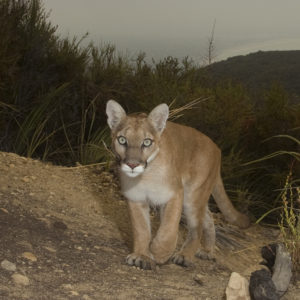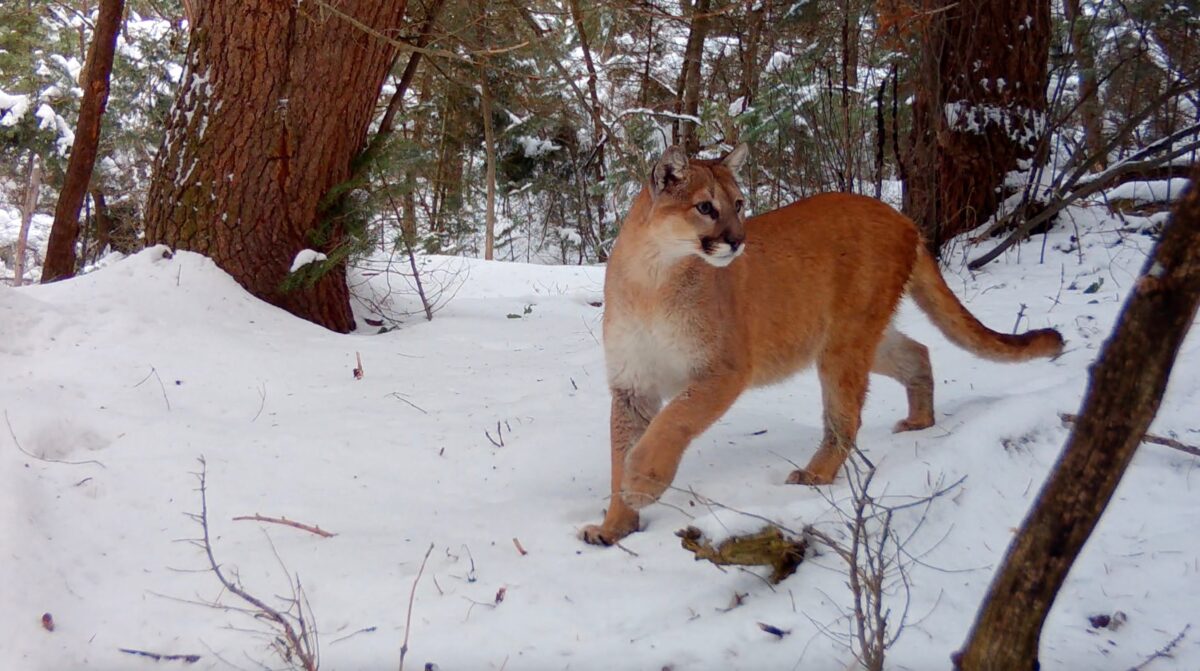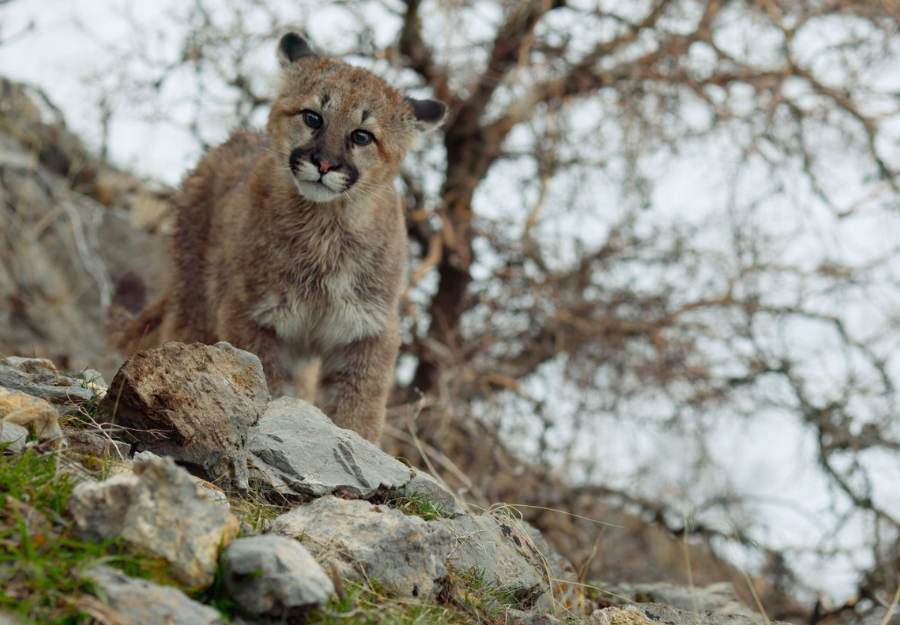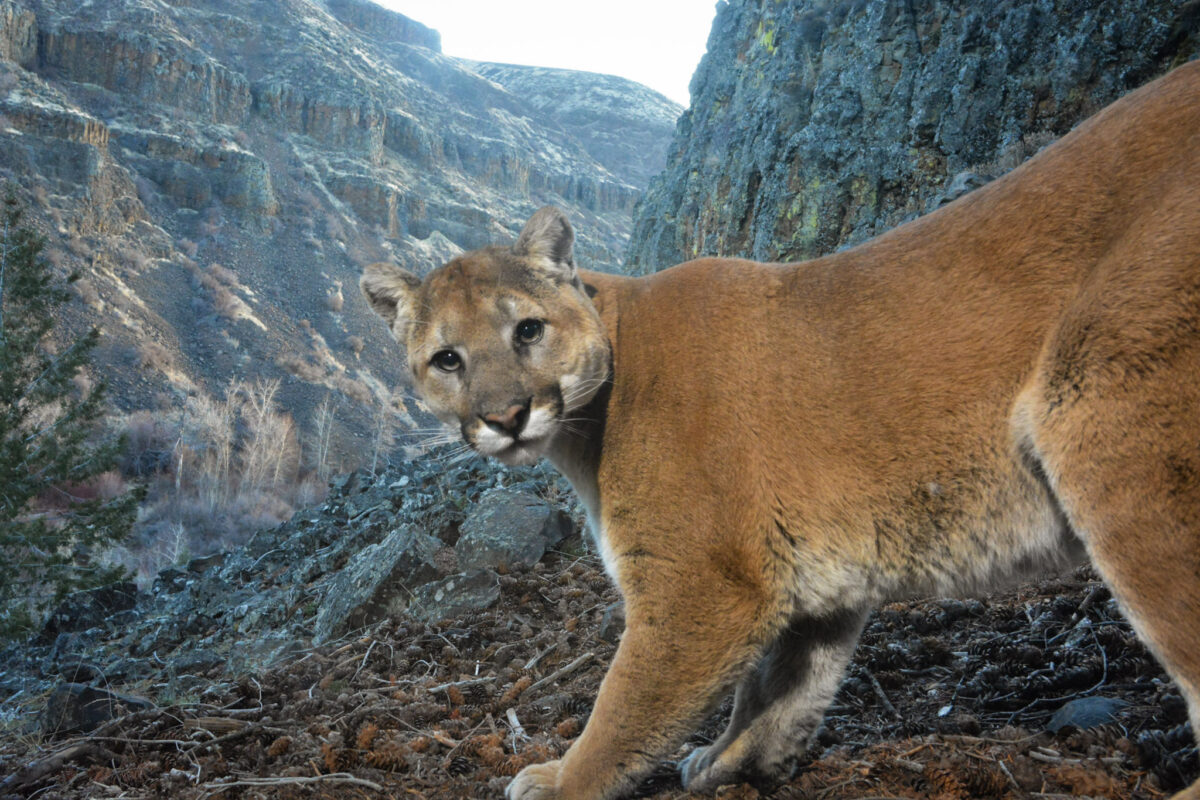An update on the Mountain Lion Foundation’s support services in San Diego County
Story by Gowan Batist and Lace Thornberg
The Cuyamaca Mountains in southern California are a scenic range dominated by oak forest and chaparral, interspersed with pines and with year-round creeks and waterfalls that provide lush oases in this arid zone.
With two large protected natural areas — Cuyamaca Rancho State Park (25,000 acres) and the Cleveland National Forest (approximately 120,000 acres) — this region of San Diego County provides high-quality habitat for mountain lions.
The mountain lions in this area are reasonably active cats that occasionally appear in and around the small communities here. Thanks to our Field Representative Jane Santorumn, the Mountain Lion Foundation has made an impact near Julian, California, on the northern end of these mountains for the past several years. Jane has conducted numerous “house visits” to address specific issues, helped livestock owners build cougar-proof pens, given presentations on better livestock pens and enclosures, worked closely with California Department of Fish and Wildlife on at least one major research project, and provided tailored presentations to children.

Pine Valley, a small, census-designated area located roughly 35 miles east of San Diego, along the I-8, has had considerable cat activity in the last three years, and particularly in the last few months. Cat sightings and encounters are frequent and have caused concern in the community. Long-time Mountain Lion Foundation volunteer Robin Parks has provided presentations in Pine Valley in the past and has recently renewed his efforts there, giving presentations to the deputies and volunteers at the San Diego Sheriff’s Office substation and at the public library. On April 18, Parks gave a second “Living with Lions” presentation at the Pine Valley Community Center, at the request of the local Fire Safety Council. This presentation was well attended, the audience was supportive and receptive, and nearly half of the people there had seen or encountered a mountain lion in recent weeks.
As is the case in so many other places in California, Pine Valley has also been the site of cats killed by vehicle strikes. Recently, three cats were killed just in the space of about a month, another problem the Mountain Lion Foundation is keen to address. In early February, Robin worked with wildlife and crossing specialists from the Wildlife Research Institute, based in Julian, to examine the specific sites and determine if any recommendations could be made to Caltrans or other authorities.
To Encourage Coexistence, Knowledge is Key
The idea of coexistence means living side-by-side with mountain lions in a way that is as supportive as possible of both species thriving.
Sounds great, right? But, how do you do that?
Through our coexistence program, the Mountain Lion Foundation provides resources that help people who live, work and recreate in lion country gain the skills, knowledge and experience that they need to practice successful coexistence with mountain lions. Our resources are grounded in both the latest science and the lived experiences of the generations of people who have practiced proactive coexistence in their day-to-day lives.
The presentations that Robin Parks delivers, in his role as Field Representative, are one great example of this work. Robin’s talks explore the cause-and-effect relationship between humans and the natural world. These talks are not made for kids, nor are they for people looking for a basic natural history lecture. He pulls no punches in delivering the facts, and while he shows images that can be upsetting for some viewers, the images underscore the fact that communities living in lion country must take proactive coexistence seriously, both for their own safety as well as for the safety of their livestock and pets. Encounters with cougars do happen. Fortunately, common-sense tools and strategies can dramatically reduce the risks from these encounters.
The ground he covers in these talks includes basic recognition training, how to understand lion behavior that is and is not threatening, and countermeasures and deterrents. His talks for law enforcement are tailored to include real-world scenarios where officers might be called on to respond.
Between those two types of presentations, Robin gives upwards of 25 talks per year.
A Credible Voice
A stalwart defender of mountain lions who began volunteering with the Mountain Lion Foundation in 2004, Robin Parks brings a unique perspective and critical skillset to his work, thanks to a 25-year career with the Naval Criminal Investigative Service.
This background gave him the language and the shared life experience to speak with authority to people in agencies who are unaccustomed to taking advice from civilian experts, and that sometimes includes law enforcement.
With an affable air, a wealth of animal encounter stories, and a wry sense of humor, Robin is an engaging speaker. At the same time, he has a seasoned professional’s lack of patience for overreaction or bad decision-making. Parks expects a high level of accountability and professionalism, and he brings that perspective to his presentations.
To homeowners and homesteaders concerned about mountain lion depredation, he’ll plainly say, “You can’t wave a goat steak in front of a mountain lion and expect them not to eat it. You have to protect your animals ….and a 3-foot picket fence just won’t cut it.”
It’s an unsentimental approach that holds an empowering message: you can do the right thing, and the Mountain Lion Foundation can help you find the tools and techniques to do so.
Slow and Steady Saves Lions
The Mountain Lion Foundation is fortunate to have Jane, Robin and other folks like them on the side of mountain lions.
In an increasingly polarized and sensationalist political and media landscape, Robin’s humane, honest and directly applicable approach is just what’s needed to help us all coexist as a community with the natural world. Empowering civilians and law enforcement alike with the practical skills they need to share the landscape safely with mountain lions is slow, steady, and durable work that has saved many mountain lions from perishing needlessly.



 Facebook
Facebook Twitter
Twitter Send Email
Send Email


